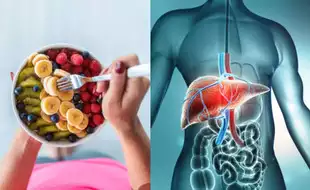Diabetes in Winter: Low Glycemic Foods That Control High Blood Sugar At night
Dec 13, 2024
News

Seasonal spikes in diabetes in the long run can lead to heightened risks of complications like nighttime hyperglycemia, poor circulation, and other heart issues
Diabetes in Winter: Diabetes affects millions of people across the world and this challenging condition only intensifies as temperatures drop. According to experts, cold weather triggers hormonal changes, which thereby increase insulin resistance and blood sugar levels.
And so, seasonal spikes in diabetes in the long run can lead to heightened risks of complications like nighttime hyperglycemia, poor circulation, and other heart issues. While medicines are there to take care of glucose levels, there are simple and easy dietary tweaks you can make to help sort out the issue.
Incorporate low glycemic index foods
Doctors suggest eating foods that are low in glycemic index, meaning foods that rank on a scale from 0 to 100, where the low end of the scale has foods that have little effect on blood sugar levels. The high end of the scale has foods that have a big effect on blood sugar levels.
Winter superfoods that are low in GI and that you must add to your daily diet routine to control high blood sugar spikes at night include:
Pumpkin and pumpkin seeds
This bright yellow and orange-coloured vegetable is loaded with fibre and antioxidants and is a great choice for blood sugar regulation. It is high in carbs known as polysaccharides that have the most potential for blood sugar regulation.
Also, pumpkin seeds are loaded with healthy fats and protein, which make them an excellent choice for blood sugar management.
Okra
Okra, commonly known in India as lady’s finger or bhindi is actually a fruit commonly consumed like a vegetable. It is a rich source of blood sugar-lowering compounds like polysaccharides and flavonoid antioxidants. Okra seeds are also super beneficial as a natural remedy for diabetes due to their potent blood sugar-lowering properties.
Flavonoids like isoquercitrin and quercetin 3-O-gentiobioside in this winter delicacy help reduce blood sugar by inhibiting certain enzymes.
Flaxseeds
Rich in fibre and healthy fats, flaxseeds are a winter delight that keep you warm as well as regulate your blood sugar levels.
According to studies, those with type 2 diabetes consuming around 200 gms of yogurt with flaxseed daily would experience significant reductions in HbA1c, a marker of long-term blood sugar regulation.
Berries
Winter is the best time to spot and eat colourful berries—strawberries, blueberries, and blackberries. They are a powerhouse of fibre, vitamins, minerals, and antioxidants—all of which make them an excellent choice for people with blood sugar management issues.
Research says consuming berries along with a high-carb meal significantly reduces postmeal insulin and blood sugar in adults with prediabetes.
Oats
One of the favourite breakfasts across the world, oats and oatmeal is a wonder food for improving your blood sugar levels. It is high in soluble fibre, and so, can significantly reduce blood sugar levels.
In winter, when it becomes difficult to manage weight, oats help in doing that as well.
Eggs
Eggs are among the best sources of protein, healthy fats, vitamins, minerals, and antioxidants—all of which help in bettering blood sugar regulation.
According to experts, those who are overweight or obese and either prediabetic or have type 2 diabetes should eat at least one egg a day to significantly reduce fasting blood sugar by 4.4 per cent and improve their insulin sensitivity.
Get Latest News Live on Times Now along with Breaking News and Top Headlines from Diet, Health and around the world.



